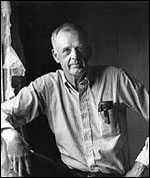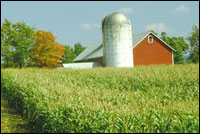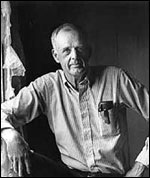
Wendell Berry, right at home.
Wendell Berry, 70 years old today, has established himself as many things in his lifetime: a veteran sage of sustainable agriculture; a progressive defender of virtue and tradition; one of our most famous farmers to renounce the tractor; and one of our most acclaimed authors to shun the computer.
To appreciate Berry, you must first understand that he has staked his life on a gamble of faith — “the faith being,” he says, “that if you make a commitment, and hang on until death, there are rewards.” His own commitment, most of all, is to place: to finding a home and staying there.
While keeping himself put, Berry has constructed a politics that has changed little over his 45-year literary career, yet remains iconoclastic. In the 1970s, he made new-guard environmentalism look aged by marrying it with traditional agrarian sentiment. Then he made “conservatives” look like reckless futurists by pointing to the threat that unchecked market growth and technological expansion pose to both community values and ecological well-being. In a nation ostensibly locked into a well-defined political divide, he represents an American voice that avoids easy classification.
In the early 1960s, Wendell Berry was on his way to a bright career in the literary world. The envy of many other young, cosmopolitan authors, he had published a book of poems and a novel. He finished a fellowship at Stanford and accepted a coveted teaching position at New York University.
Then, in 1964, Berry decided to abandon the city and return to his rural roots. Attempting to dissuade him, elder faculty members warned, “Young man, you can’t go home again.” Yet Berry did just that. He moved to Henry County, Kentucky — where his forebears had worked the land for more than 150 years — to tend his family farm and to teach. There he has remained, producing more than 40 books of poetry, fiction, and essays.
When Wendell Berry was born on Aug. 5, 1934, there were some 6.8 million family farms in the U.S. By 1975, the number had fallen by more than 60 percent, to 2.5 million. The size of individual farms had skyrocketed. And the use of petrochemical inputs, rarities before World War II, had soared. These changes were less the product of technological inevitability than of design. Through subsequent administrations, the Department of Agriculture told farmers to “get big or get out.” Earl Butz, secretary of agriculture under Richard Nixon, proclaimed that farming “is now a big business” and that the family farm “just like the modern business enterprise … must adapt or die.”
By the 1970s, there was widespread discontent among farmers about the impact of agribusiness methods: the monocultures and pesticides, the expansion and debt. Wendell Berry crystallized and sharpened small farmers’ inchoate despair. In his 1977 The Unsettling of America, he produced the most withering critique of industrial agriculture to spring from a nascent movement for sustainable farming.
“Without regret,” Berry wrote, “with less and less interest in the disciplines of thrift and conservation … our present agriculture wastes topsoil, water, fossil fuel, and human energy. … We are eating thoughtlessly, as no other entire society ever has been able to do.”
City dwellers could ill-afford to ignore these trends, he argued. “[N]o matter how urban our life, our bodies live by farming; we come from the Earth and return to it, and so we live in agriculture as we live in flesh.” Elsewhere in the book he concluded, “To live at the expense of the source of life is obviously suicidal.”
In the two and a half decades since he wrote those words, Berry has continued to voice the same concern. As he put it in 1999, “Our farm policy, like our energy policy, is simply to use up all we can.” Opposing this mindset, he has emerged, through his essays and literary works, as a key spokesperson for agrarianism, a philosophy that celebrates the small farmer’s careful stewardship of the land. Like agrarians before him, Berry invokes Jeffersonian ideals: “Cultivators of the Earth are the most valuable citizens,” the founding father wrote. “They are the most vigorous, the most independent, the most virtuous, and they are tied to their country and wedded to its liberty and interests by the most lasting bands.”
As the mention of a powdered-wigged president suggests, agrarianism has been around for a long time. It has often been populist, but rarely ecologically minded. Scholar Kimberly Smith writes, “If Berry’s ecological agrarianism doesn’t look particularly innovative to us, it is because he makes the marriage of agrarian and environmental thought seem so natural that we assume agrarianism always implied ecological sensitivity — or that ecological sensitivity always implied support for family farming.” In fact, before Berry, the gulf between farmers and environmentalists was nearly as deep as that between loggers and tree-sitters.

The family farm — where
environmentalism becomes
old again.
Berry established himself as a key figure in bridging a gap filled with mutual suspicion. He was born among older farmers and had returned to their fold. But he had also spent time surrounded by the emerging New Left and had campaigned against the wanton destructiveness of strip mining. He was at once a native and a “back-to-the-lander.” He represented the new face of organic farming, and its old face as well.
Smaller, Slower, Better
“Like almost everybody else, I am hooked to the energy corporations, which I do not admire. I hope to become less hooked to them. In my work, I try to be as little hooked to them as possible. As a farmer, I do almost all of my work with horses. As a writer, I work with pencil or a pen and a piece of paper.”
Thus began the essay that, perhaps more than any other, has generated controversy and criticism for Wendell Berry: his 1987 work, “Why I Am Not Going to Buy a Computer.” As far back as The Unsettling of America, some supporters had suggested that Berry’s unabashed admiration of the Amish gave his detractors too easy a target. But it was the writer’s rejection of Windows and Mac that really hit a nerve. The essay, which was published in Harper’s, prompted a spray of derisive letters.
Berry was undeterred. Then as now, when branded a Luddite, Berry rises to the group’s defense. “These were people who dared to assert that there were needs and values that justly took precedence over industrialization,” he writes; “they were people who rejected the determinism of technological innovation and economic exploitation.”
We would do well to maintain such skepticism today, Berry contends. He does not reject new inventions out of hand. He flies in airplanes, drives a car, and cuts wood with a chainsaw. But he is not willing to accept technological “advances” for their own sake. He challenges us to ask “what higher aim” each new innovation serves, and what its likely impact on our communities will be.
In a society that steadfastly equates technology with progress, such questioning is heresy. It would condemn Berry to the outhouse of public opinion — except that, with his impeccably logical prose, he makes his position seem so close to common sense. Instead of rolling our eyes, we wonder why we didn’t think of it first.
Take his view of the computer: “[A] computer, I am told … will help you write faster, easier, and more. … Do I, then, want to write faster, easier, and more?” he asks. “No. My standards are not speed, ease, and quantity. I have already left behind too much evidence that … I have written too fast, too easily, and too much.” He writes elsewhere: “Going off to the woods I take a pencil and some paper … and I am as well equipped for my work as the president of IBM.”
Quoting Edward Abbey, Berry charges that the global economy operates on “the ideology of the cancer cell.” That is, it must grow to survive. “The aims of … limitless growth, limitless wealth, limitless power, limitless mechanization and automation,” Berry writes, “can enrich and empower the few (for a while), but they will sooner or later ruin us all.”
This is the larger point of his technological criticism. You may not agree with Berry about where to draw the line, but if we are to survive, surely the line must be drawn.
Freedom, in Berry’s view, is not about unconstrained individual autonomy, but rather about choosing which constraints we will abide by and which communities we will be responsible to. It is about making active choices in an age of passive consumption. In a highly mobile era, when many people are involuntarily pushed about by the global economy, his choice to root himself in a single county is less a throwback than the exercise of a very modern and privileged freedom. Likewise, in a time marked by unthinking adulation of all things electronic, careful consideration of technology is less antiquated than avant-garde: “If the use of a computer is a new idea,” Berry writes in a sly moment, “then a newer idea is not to use one.”
Left, Right, Left, Right
Berry is unconcerned with people labeling his personal acts of resistance “insignificant.” “Thoreau gave the definitive reply to the folly of ‘significant numbers’ a long time ago: Why should anybody wait to do what is right until everybody does it? It is not ‘significant’ to love your own children or eat your own dinner, either. But normal humans will not wait to love or eat until it is mandated by an act of Congress.”
This attitude of personal responsibility defines Berry’s politics. It also infused several of his early poems, which looked critically upon the Vietnam War. In “February 2, 1968,” he writes:
In the dark of the moon, in the flying snow, in the dead of winter,
war spreading, families dying, the world in danger,
I walk the rocky hillside, sowing clover.
The poem offers an eloquent personal response to the ravages of war. At the same time, it pointedly avoids embracing the protest movement that so troubled Lyndon Johnson.
Indeed, Berry’s political orientation has been notoriously difficult to label. If his anti-war sentiment, his environmentalism, and his distaste for the market economy have suggested that he is a leftist, other characteristics have made some wonder if Berry isn’t, at heart, a conservative.
In an environmental movement more accustomed to New Age mystics and bioscience agnostics, Berry’s devout Christianity stands out. His stalwart adherence to a Biblical framework has endeared him to many more-conservative churchgoers and has produced metaphors uncommon in mainstream environmental literature. (Topsoil “is very Christ-like,” he writes in his 1968 essay “A Native Hill.”)
Berry’s praise for the Amish and his lectures on marital fidelity suggest that he favors a stern social order. And, whether he is speaking of bad behavior (“foolishness,” “pride,” “sin,” “error,” “carelessness”) or good (“character,” “virtue,” “moral law,” “fidelity,” “reverence”), his language is moralistic, which risks making him sound like an agrarian Dr. Laura.
Several factors, however, indicate that Berry has succeeded in making progressive ideas appear conservative, and not vice versa.
Having undertaken a serious reckoning of his own faith and having grounded himself in the Christian tradition, he shows no trace of zealotry. He acknowledges a deep debt to Buddhism and proposes, in the wake of 9/11, that “[o]ur schools should begin to teach the histories, cultures, arts, and languages of the Islamic nations.” His willingness to struggle openly with religion ends up enhancing his moral authority. Combining his care for the earth with his articulate spirituality, he is able to propose that a properly Christian economy (like a properly Buddhist one) is unlikely to permit strip mines. Finally, Berry avoids self-righteousness by implicating himself in the evils he criticizes. He, too, is hooked to the energy corporations, and he won’t hesitate to remind you of it.
A friend once said to me of Berry, “If he were a movement, I would oppose him.” But he is not a movement, and he would not care to be one. Rather, he is a moral voice. He means not to be emulated so much as carefully considered.
That he has no interest in disciples is fortunate, for his many admirers could hardly fit in Henry County. At 70 years old, Wendell Berry is reaping the rewards of having found his place in the world. He admonishes his readers to do the same.
Berry writes in his poem, “Stay Home”:
I will wait here in the fields
to see how well the rain
brings on the grass.
In the labor of the fields
longer than a man’s life
I am at home. Don’t come with me.
You stay home too.



